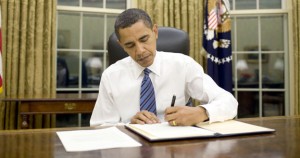A closer look at the National Defense Authorization Act

President Obama signed the National Defense Authorization Act (NDAA) into law six days ago. Since that time, public backlash hasn't waned much. It's forgivable if a week-long media monsoon has you thinking that the president just authorized the indefinite detention of U.S. Citizens without trial. A closer reading of the new law, while taking into consideration the president's signing statement, will provide a more accurate assessment of what NDAA likely means for you, me, and the future of the Obama administration.
The NDAA grants to the military broad new powers against suspected terrorists, codifying the indefinite detention of American citizens detained abroad and possibly those detained at home, without trial. In his signing statement, President Obama clarified:
“My Administration will not authorize the indefinite military detention without trial of American citizens." He continues, "Indeed, I believe that doing so would break with our most important traditions and values as a Nation."
Take note. He doesn't say indefinite detention of U.S. citizens breaks the law. The Obama White House has always argued for broad detention powers, saying that the original 2001 AUMF authorized such action against suspected enemy combatants, regardless of citizenship.
“Obama’s signing statement seems to suggest he already believes he has the authority to indefinitely detain Americans—he just never intends to use it,” writes Adam Serwer at Mother Jones. “Left unsaid, perhaps deliberately, is the distinction that has dominated the debate over the defense bill: the difference between detaining an American captured domestically or abroad. This is why ACLU Director Anthony Romero released a statement shortly after Obama’s arguing the authority in the defense bill could 'be used by this and future presidents to militarily detain people captured far from any battlefield.' ”
Glenn Greenwald notes that the law only exempts US citizens “from the requirement of military detention but still leaves the option open to the state.”
The most significant change NDAA brings to the 'War on Terror' is the expanded scope of military operations to include U.S. soil. Critics argue the law creates an assumed role for the military in domestic law enforcement.
With all of the legal uncertainty surrounding the scarier sounding provisions, it begs the question: how might Obama's signature on NDAA affect his support? In my view, President Obama might have just handed the GOP (or any third party contender) a weapon that could ensure a wide open race – a civil liberties caucus. An independent-minded candidate could win the support of enough disgruntled progressives, moderates, and libertarians to make himself automatically more appealing than an incumbent who seems to make it a habit of erring on the side opposite the Bill of Rights.



